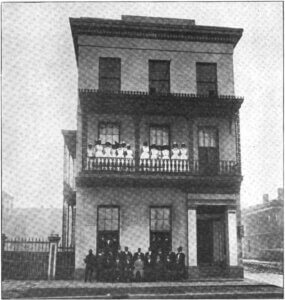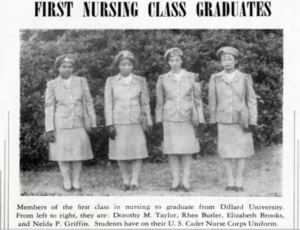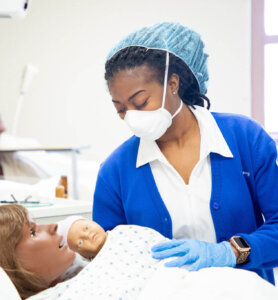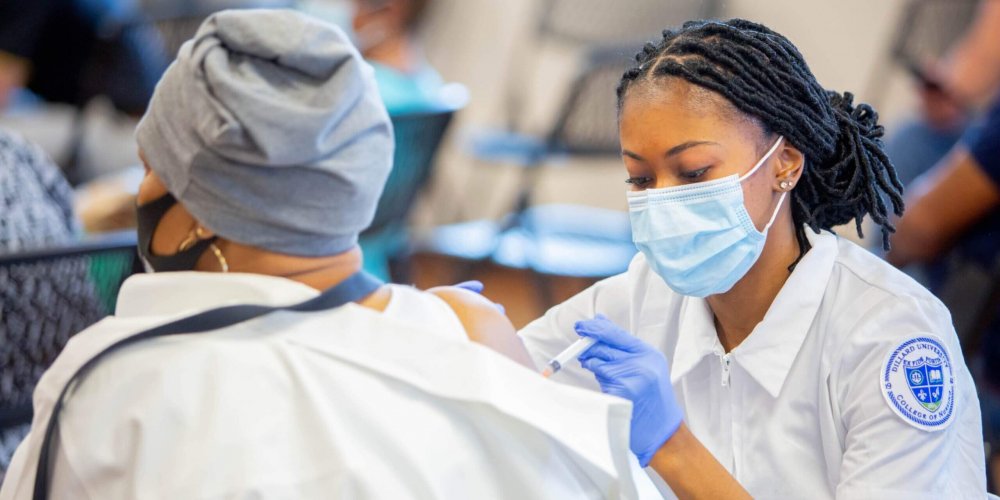Home » Academics » — College of Nursing » History of Nursing at Dillard
Degrees & Certificates
Historically Black University in Louisiana
Students to faculty ratio
Contact Us
College of Nursing
PSB, Suite 102
2601 Gentilly Boulevard
New Orleans Louisiana 70122
Ph. (504) 816 – 4717
DUCON@dillard.edu
Office Hours:
M-F 8 a.m. – 5 p.m.
 In the strictest sense, the baccalaureate nursing program is not an outgrowth of the hospital school formerly operated in Flint-Goodridge Hospital, the Sarah Goodridge School of Nursing. Although the fact that Mr. Albert Dent who was superintendent of the hospital during the existence of the diploma program and later became President of Dillard University, and was a staunch advocate of baccalaureate nursing, it cannot be dismissed.
In the strictest sense, the baccalaureate nursing program is not an outgrowth of the hospital school formerly operated in Flint-Goodridge Hospital, the Sarah Goodridge School of Nursing. Although the fact that Mr. Albert Dent who was superintendent of the hospital during the existence of the diploma program and later became President of Dillard University, and was a staunch advocate of baccalaureate nursing, it cannot be dismissed.
Mr. Dent declared that “a nursing program in Dillard University should develop better persons as well as better nurses; persons who will provide leadership in an increasingly important profession” (Hine, 1989). Together with Ms. Rita E. Miller, an especially able nurse who understood and championed professional nursing education, their argument for a black baccalaureate program in nursing was persuasive. With the support of President Dent, Ms. Miller devised a rigorous 5-year academic program with high admission standards. The baccalaureate program started in 1942. The nursing cap selected to represent Dillard nursing students was the four-cornered mortarboard. The four points of the cap are dignity, integrity, leadership, and loyalty (DILL).
The excellent working relationship between the academic program and Flint-Goodridge Hospital provided access to hands-on-experiences and established Dillard as a “…model and an inspiration for the development of other black collegiate nursing schools, most notably the one that came into existence at Florida A&M” (Hine, 1989, p.229). This early start gave Dillard the distinction of being the first baccalaureate nursing program in the State of Louisiana. The nursing program received full accreditation from the National League for Nursing Accreditation Commission (NLNAC) in 1952, currently the Accreditation Commission for Education in Nursing (ACEN), making it the first accredited baccalaureate nursing program in the State of Louisiana.
 The first class of nurses graduated in 1947. Since that time, more than sixteen hundred nurses have completed the program. It has educated students from across Louisiana, all parts of the United States, and from abroad. Its graduates practice in all sectors of health care and education, private industry, and politics. Individually and collectively, their achievements are numerous and the contributions to the profession of nursing and society are significant.
The first class of nurses graduated in 1947. Since that time, more than sixteen hundred nurses have completed the program. It has educated students from across Louisiana, all parts of the United States, and from abroad. Its graduates practice in all sectors of health care and education, private industry, and politics. Individually and collectively, their achievements are numerous and the contributions to the profession of nursing and society are significant.
The Nursing program continues to hold accreditation with the Accreditation Commission for Education in Nursing (ACEN) and full approval with the Louisiana State Board of Nursing. Its mission, the College of Nursing, is to develop students who are broadly educated, technologically astute, and culturally sensitive, into proficient, prudent practitioners. Dillard Nursing graduates utilize a holistic approach to provide care that improves the human condition of individuals, families, and communities in a diverse global
 Dillard’s curriculum experienced several changes. In 1969, under the leadership of Ms. Rita Miller, the program’s curriculum changed from a five-year to four-year BSN degree program. Establishment of bylaws under Dr. Ethel Amos, establishment of dual admissions with Dr. Enrica Singleton, expansion of clinical affiliates with Dr. Betty Adams, the establishment of simulation lab with Dr. Edwina Frank; the establishment of the Coulter Lab for the modernization of the simulation labs with Dr. Betty P. Dennis. Additionally, the interim Chairperson Dr. Lenetra Jefferson separated the didactic and clinical components of the specialty nursing courses. Corresponding with these changes was the nursing program’s status within the University. The nursing major would move from a program under Dr. Cook to the Division of Nursing. The status would then become a School of Nursing, under Pres. Michael Lomax and Provost Bettye Parker-Smith. Under the leadership of Pres. Dr. Walter Kimbrough, and V.P. of Academic Affairs, Dr. Yolanda Page, it would become the College of Nursing in 2018.
Dillard’s curriculum experienced several changes. In 1969, under the leadership of Ms. Rita Miller, the program’s curriculum changed from a five-year to four-year BSN degree program. Establishment of bylaws under Dr. Ethel Amos, establishment of dual admissions with Dr. Enrica Singleton, expansion of clinical affiliates with Dr. Betty Adams, the establishment of simulation lab with Dr. Edwina Frank; the establishment of the Coulter Lab for the modernization of the simulation labs with Dr. Betty P. Dennis. Additionally, the interim Chairperson Dr. Lenetra Jefferson separated the didactic and clinical components of the specialty nursing courses. Corresponding with these changes was the nursing program’s status within the University. The nursing major would move from a program under Dr. Cook to the Division of Nursing. The status would then become a School of Nursing, under Pres. Michael Lomax and Provost Bettye Parker-Smith. Under the leadership of Pres. Dr. Walter Kimbrough, and V.P. of Academic Affairs, Dr. Yolanda Page, it would become the College of Nursing in 2018.
With each restructuring faculty reviewed, revised curriculum plans, and modified content in accordance with current trends in nursing education and practice. Faculty engaged in curriculum mapping whose outcomes included curriculum revision. Faculty based all changes on evaluation data, including senior nursing student exit interviews. Appropriate educational resources supported new emphases in the scope of practice and the integration of technological into the nurses’ role. Nursing labs therefore became outfitted with high fidelity/realistic patient simulators to promote the practice of teamwork, leadership, and communication skills, and best practices in nursing education. With this technology, students have earlier and sustained access to situations like intravenous placement and monitoring, intervention in pharyngeal swelling, cyanosis, hypoxia, pacing, fontanel changes and defibrillation. Using pre- programmed scenarios, faculty developed scenarios; all clinical courses began n using human patient simulation.

In 2007, the Division of Nursing established a partnership with the HBCU Research Network to host a national conference that focused on health disparities research. In addition to Dillard students and faculty, attendees came from throughout the United States.
In 2008, the Division of Nursing joined two area nursing programs becoming the third member of an at-large- Sigma Theta Tau chapter. In 2009, the Division of Nursing hosted the chapter’s first Research Day.
Successes of faculty and students and nursing leadership led to accolades from the Historically Black Colleges and University Media Digest naming the School of Nursing the Best Nursing Program for the years 2013 and 2014. Nursing continue to engage in community service through the Dillard’s chapter of the National Student Nurses Association, Sigma Theta Tau, and University and Dillard University Professional Organization of Nurses (DUPON) sponsored events.
Throughout the nursing programs legacy, the program experienced growth and challenges, but never closed its doors. The establishment of the Dillard University Nursing Advisory Council (DUNAC, 2014)) comprised of nursing alumni, community stakeholders, and agency affiliates continues to contribute to nursing’s success.
Today, the College of Nursing continues to offer the three BSN degree options. Students admitted to the nursing program receive mentoring through the Dillard University Nursing Alumni Program (DUNAP, 2016) which is comprised of DUPON mentors and student peer mentors.
The College of Nursing expanded its simulation labs to include both the Women’s Health and Maternal Newborn and Community health simulation labs. Faculty also engage students in latest clinical Students also have the opportunity to engage in virtual simulation escape rooms led by Dr. Charlotte Hurst. Additionally, to meet the needs of the changing student demographics and trends in healthcare, Dillard became the first nursing program in Louisiana to offer a minor in healthcare advocacy, under the leadership of Dr. Sharon Hutchinson, Dean of Nursing.
In 2022, the Dillard University Board of Trustees approved the offering of graduate education at Dillard University beginning with the College of Nursing; the designated degree will be the Masters of Science in Nursing (MSN).
The legacy of the Dillard nurse continues to move forward.
2601 Gentilly Boulevard
New Orleans Louisiana 70122
(504) 283 – 8822
© 2025 – All Rights Reserved